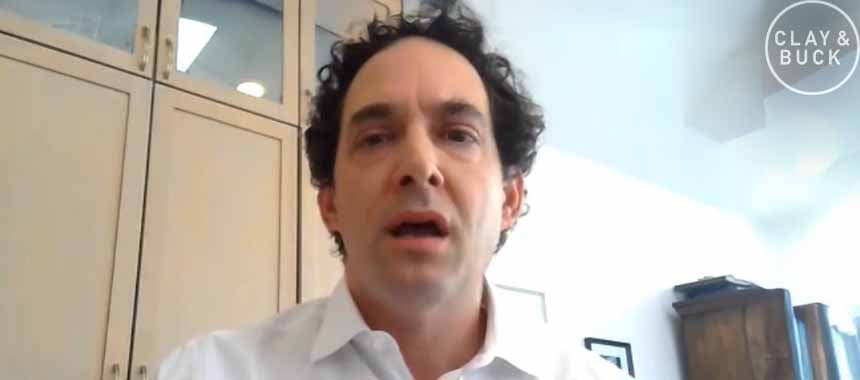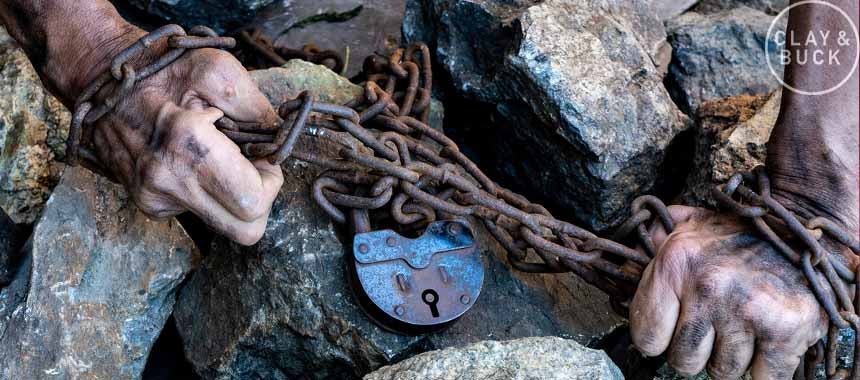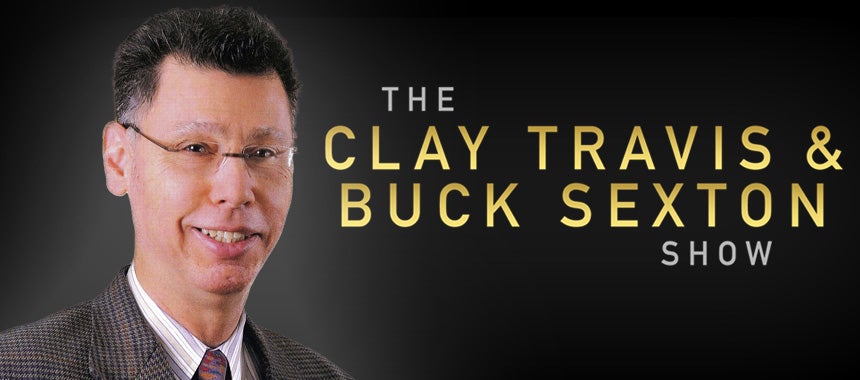Yale Epidemiologist Dr. Harvey Risch on How to Treat Covid
27 Sep 2021
Listen Here:
Visit Dr. Risch’s website: EarlyCovidCare.org
CLAY: We bring in now an expert in much of the covid-related discussion from a medical perspective. He is Dr. Harvey Risch. He is an MD and a PhD professor of epidemiology at Yale School of Public Health. You can read much of his opinions on EarlyCovidCare.org. That is EarlyCovidCare.org.
Dr. Risch, I appreciate you joining us right now. I want to play for you Joe Biden talking — as he was getting his vaccine — about what’s necessary for enormous to return in this country. He says that we need 97 or 98% vaccination rate in this country. Let’s play cut 28.
REPORTER: How many Americans need to be vaccinated for us to go back to normal? What is the percentage of the total vaccinations that have to be in place before getting back to normal?

BIDEN: Well, I think… Look… I think we get the vast majority, like, that’s going on in some of these — some industries, 97%, 98%. I think we’re getting awful close, and… But I’m not the scientist. Uh… Uh, I think one thing for certain: A quarter of the country can’t go unvaccinated.
CLAY: All right. So, Dr. Risch, I appreciate you joining us. Right now, around 77% of adults are vaccinated or have at least received their first shot. Your reaction to the president saying that 98 or 99% of people need to be vaccinated to get back to normal.
DR. RISCH: Well, it’s great to be with you. I’m glad the president said that he’s not a scientist, because when he said isn’t scientific. And what we need is a very high amount of natural, post-infection immunity. The vaccines contribute to immunity but not in the way that one would think about it. What we need is people who have gotten the immunity from having had the illness. About 70% of Americans so far already have this, and they do not need to be vaccinated. They have much stronger immunity.
CLAY: Sorry to cut you off, Doctor, but you think around 70% of Americans — based on the data that you’ve looked at — have already been exposed to covid and/or recovered from it?
DR. RISCH: Yes. It’s very clear that the CDC has done surveys of antibodies to covid in the blood of people and what they found is that almost fivefold numbers of people have had covid, mostly asymptomatically, as the numbers of registered cases. So this means that approximately close to or over 70% across the country as a whole have had covid and have wide immunity to not just the Delta variant, but more or less any variant that comes along over the next six months to a year. They’re protected.
BUCK: Dr. Risch, can I ask…? It’s Buck. I just want to know, we’ve seen over the last couple of months what seems to some to be the seasonal effect of covid, but there were a surprisingly high number of cases, especially given the degree of natural immunity, as well as all the vaccinations that have gone on. How do you explain what’s happening here? Even today, at this point as we sit here speaking to you there are 120,000 cases as of September 26 and on average, 2,000 new deaths a day. What’s going on?
DR. RISCH: Well, we’re still battling the infection. Covid is not a trivial illness. It is something that has to be taken seriously. It has to be treated aggressively ASAP when people become symptomatic if they are high risk. And even today with the Delta strain, we want to do for most people if possible. But we also have almost a dozen medications that can be used in sequence and together to reduce the illness and make the symptoms go away.
But they have to be used in the first five or six days, started in the first five or six days. There are doctors across the country who are doing this. More than 150,000 people have been treated early using these medications. The website that you mentioned earlier, EarlyCovidCare.org, all of the information, both lay and medical, technical information about all of this is all laid out there.
 BUCK: Can I ask you, Doctor, just for everyone listening: So if anyone out there, let’s say, is still concerned and maybe they’re in a higher risk pool for covid, vaccinated or unvaccinated — if you think you got covid and you think it’s gonna be bad — what are the first things you should do?
BUCK: Can I ask you, Doctor, just for everyone listening: So if anyone out there, let’s say, is still concerned and maybe they’re in a higher risk pool for covid, vaccinated or unvaccinated — if you think you got covid and you think it’s gonna be bad — what are the first things you should do?
DR. RISCH: The first thing you should do is call a clinician who will be willing to treat it if necessary. And there are… We also have a list of sites that provide access to doctors who are quite public about their willingness to treat covid early, both by telemedicine and by in-patient visits.
BUCK: But monoclonal antibodies, talking about some of the early interventions, you mentioned early interventions. What are the best ones right now?
DR. RISCH: The monoclonal antibodies contributes to early treatment. Hydroxychloroquine, ivermectin are very strong medications that work. Colchicine is another one. Steroids are in use. Vitamin D and zinc contribute to the whole pattern of care. There’s a number of them that are available, and doctors who are actively treating patients know how to use these. They are extremely successful, extremely successful in treating patients as outpatients.
CLAY: We appreciate Dr. Risch joining us now, encourage you check out his website laying out these things, maybe go ahead and make it a favorite and pull it up so you’ve got access to it if you need it in the future. EarlyCovidCare.org is that website. EarlyCovidCare.org. Dr. Risch, you’re obviously credible, well credentialed. You know of which you are speaking, and we appreciate you coming on this show.
But there are so many people — and let me repeat your credentials again. You are an MD and a PhD, professor of epidemiology at Yale School of Public Health. How much pressure in your world is there to avoid having opinions like yours and to be a little bit outside of the consensus as it would be led by the Fauciites and the Biden administration? Is there pressure to hew to what they say in your profession?
DR. RISCH: Yes, there is, but most of that pressure is coming from censorship. From Yale itself, we have a very strong support for academic freedom, and my colleagues say what they think; I say what I think. We’re cordial and collegial. And this is why I love Yale. And it’s important to recognize that. Outside of that we have social media that are suppressing any dissenting voices, and that’s really Draconian and bad for doing science and bad for objective reviews of contentious topics.
CLAY: Why do you think that censorship has taken life like it has, especially in social media? Because you can speak to this much better than I can, but the scientific method requires rigorous debate and challenging of all preconceived beliefs, hypotheses, theories. That’s how science works! It seems to me that social media is actually adopting the anthesis of science in suppressing this debate and discussion.
DR. RISCH: Yes, and you have to realize that censorship exists when the party that does the censoring cannot defend that position. So that’s the tool that’s left. When you can’t defend what you think, you resort to censorship. That’s why we see it.
BUCK: Doc, I want to ask you what you’re expecting for just the fight against covid over the next, let’s say, 90 days or so. As we’re heading into the winter, are you expecting there will be a substantial increase in hospitalizations and even fatalities from disease or, because of the levels of natural and vaccinated immunity in the general population, are we going to see a much milder winter based on the data trends right now?
 DR. RISCH: Oh, I’m very optimistic. I think that with the high levels of natural immunity, even if the new strain arises, that it’s not going to get very far. It will make bumps, not waves. So I’m very optimistic, as I said. What we need now is more natural immunity. So the breakthrough infections that occur in vaccinated people who are not at high risk are actually good because it gives them permanent immunity, essentially permanent immunity.
DR. RISCH: Oh, I’m very optimistic. I think that with the high levels of natural immunity, even if the new strain arises, that it’s not going to get very far. It will make bumps, not waves. So I’m very optimistic, as I said. What we need now is more natural immunity. So the breakthrough infections that occur in vaccinated people who are not at high risk are actually good because it gives them permanent immunity, essentially permanent immunity.
So they will not have to struggle anymore with this illness that’s endemic. It’s already endemic and will continue to be at a low level. So I’m very optimistic that it will settle down. There may be some bumps over the winter because of indoor living. But I think that overall, it’s not gonna be like what we’ve seen. And the Delta wave is definitely going down across the U.S. now.
CLAY: Dr. Risch, what do you think about children as it pertains to masks and potentially mandating vaccines in some places for kids to be able to go back to school? We get this question a lot from our audience. I’m curious, as an expert in the field, what your analysis of that would be.
DR. RISCH: In my opinion, the only children who need to be vaccinated are ones who have chronic conditions like diabetes, obesity, maybe ones with organ transplants or other reason for reduced immune function. They’re the ones at risk of a bad outcome from covid. Everybody else, the illness is extremely mild if it’s even noticed in children.
Children in general do not spread the illness. They get it from adults. And this is something that if this has been endemic in society from outset, then children would get it as little kids, nobody would notice it. It would be like a cold and they’d have lifelong community and we’d go on with it and it would be just one of those things of childhood.
So what happens is we’ve introduced it into adults from the beginning. That’s why it’s been so difficult and harder to deal with. Children do very well. They do not need vaccination, except if they’re in the very infrequent group who wouldn’t do well — and that’s very well defined, as I mentioned.
CLAY: What about masks on kids? Another big debate right now.

DR. RISCH: Well, the CDC has published two papers that I saw today that are cherry-picked evidence of what we call ecologic studies, studies of communities, not of individuals. They are not randomized studies, and they are touting their two studies, when there’s another 40 studies in the literature dealing with the efficacy of masks showing that masks don’t work.
So they’re cherry-picking the ones that they think say that masks work and they’re ignoring all the rest of the literature that show that masks don’t work. All you have to do is see somebody vaping with the mask on and you’ll see how the vape particles come out all over the sides and through the masks. So it’s not patently obvious that the masks don’t do enough.
BUCK: Masks don’t work. Dr. Harvey Risch, we really appreciate you joining us from Yale medical school. Thank you so much for being with us.
DR. RISCH: My pleasure.
Recent Stories

BOOM! Blockbuster Jobs Report Shocks "Experts"
Clay, Buck and President Trump were all right -- again.

Alex Berenson Sounds the Alarm on the Dangers of Cannabis
He was right about covid and now he's warning us about the dangers of modern marijuana.

Spanish Is the Language of Anti‑Colonialism? History Says Otherwise
This is a history lesson that should not be missed.

VIP Video: YouTube Has Changed Fame Dramatically
The guys take a look at how YouTube and other social media platforms have changed the nature of fame.

Clay's X Poll: What Do You Think Is Worse for Your Kids, Alcohol or Weed?
If you had to choose, would you rather your kids smoke pot for the rest of their lives or drink alcohol for the rest of their lives?






